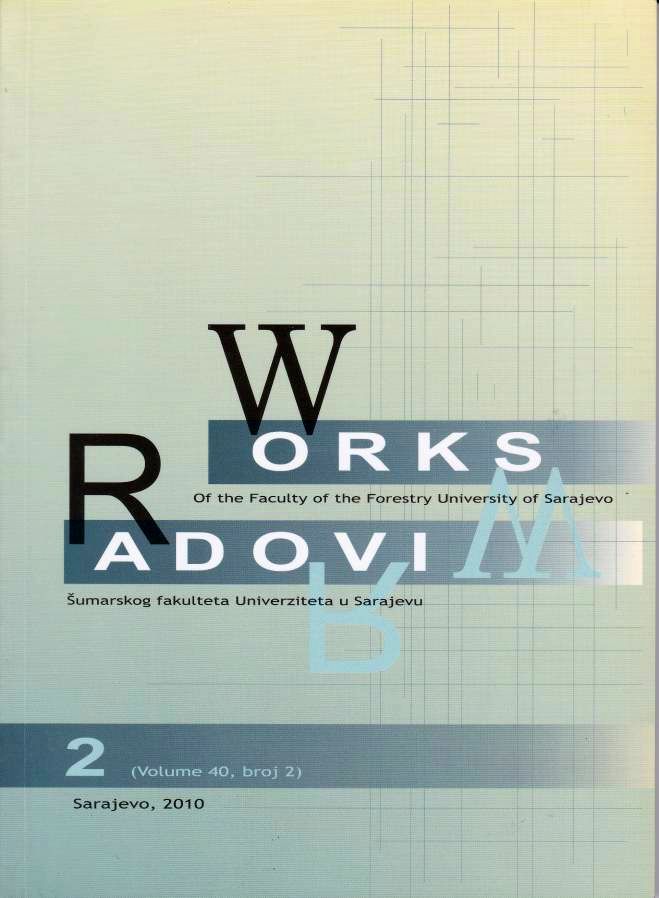Demands of Canton Sarajevo population towards forests
DOI:
https://doi.org/10.54652/rsf.2010.v40.i2.151Keywords:
forest policy, population's demands towards forest, Canton SarajevoAbstract
UDK 630*9:502.1(497.6 Sarajevo)
In order to identify demands of Canton Sarajevo population towards forests, the special questionnaire has been designed consisting of 27 questions, grouped in 5 categories (basic social-demographic data of the respondents, reasons for visiting forest and behavioural pattern, general evaluation of forest resources conditions in Canton Sarajevo, meaning and attitude towards forests, negative influences and requested corrective actions). The data have been collected by face-to-face interview with 350 inhabitants of Canton Sarajevo (combination of simple random sampling and stratified sampling) conducted from December 2008 to March 2009. The obtained data are coded, digitalized and processed by SPSS 15.0.
The majority of the respondents find ecological and social forest functions (water, air and soil protection, biodiversity conservation, climate regulation etc.) as the most important, giving them a priority in relation to the economical functions. Protean reasons of forest visits are identified with prevailing relaxation, recreational needs, sport activities and outdoor activities in broader context. The majority of the respondents consider some adjustments of forest companies' activities necessary, in order to meet various forest visitors' demands. They particularly underline a need for better forest protection and care, reduced felling, maintenance forests after harvesting, waste disposal and removal out of forests, improving of forest recreation infrastructure as well as better communication between foresters and other interest groups (e.g. visitors, tourists etc.). These requests point out to different possibilities of diversification of forest companies' business activities and a large potential for development of new and less-used forest products and services in Canton Sarajevo, derive from specific demands of the population towards forest resources.
The results of this research can be used for determining the guidelines and recommendations for creating forest policy as well as setting up the long-term development goals for forest sector in Canton Sarajevo, based on a dialogue between the population and public forest administration. Involvement of all stakeholders, particularly the public, in the process of planning and management of forest resources, would result in better transparency, strengthening the concept of forest governance and satisfaction of all parties interested in forest management. Although the majority of the respondents link a notion “forest“ with nature in wider context, clear air and other ecological and social benefits, multi-valued meaning of forest understands multifunctional forest management as an important concept of comprehensive ecological policy in Canton Sarajevo. Multifunctional forest management implies partnership between all forest policy actors in both planning of forest management and enforcement of agreed activities. Such an approach would lead to more transparent and consistent forest policy based on fundamental principles of democracy and forestry research-based recommendations.
Downloads
References
AVDIBEGOVIĆ, M. 2006: Reinženjering poslovnih sistema šumarstva u funkciji zadovoljavanja socioloških aspekata gospodarenja šumskim resursima u Bosni i Hercegovini, Doktorska disertacija, Šumarski fakultet Univerziteta u Sarajevu.
AVDIBEGOVIĆ, M., VULETIĆ, D., KRILAŠEVIĆ, E., SELMANAGIĆ, A. 2006 a: Šumska
rekreacija u BiH sa osvrtom na stanje u Hrvatskoj, Zbornik radova sa konferencije: Gazdovanje šumskim ekosistemima nacionalnih parkova i drugih zaštićenih područja, Jahorina.
AVDIBEGOVIĆ, M., VULETIĆ, D., KRILAŠEVIĆ, E., 2006 b: Karakteristike posjetitelja i razlozi posjete šumskim područjima u Kantonu Sarajevo, Radovi Šumarskog Instituta Jastrebarsko, Vol. 41, br. 1-2.
GRUPA AUTORA, 1986: Dugoročni program razvoja šumarstva u BiH za period 1986- 2000, Republički komitet za poljoprivredu, šumarstvo i vodoprivredu, Sarajevo.
MALHOTRA, K.N. 2007: Marketing Research - An Applied Orientation, Pearson - Prentice Hall, New Jersey, str. 379.
PINTARIĆ, K. 2004: Značaj šume za čovjeka i životnu sredinu, Udruženje šumarskih inženjera i tehničara F BiH, Sarajevo, str. 92.
ŠAKOVIĆ, Š., DELIĆ, S. 2003: Ekološko i ekonomsko vrednovanje šuma, Fondeko svijet, broj 15, Sarajevo, str. 22-23.






















